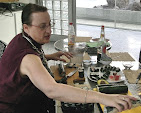Cooking from original medieval and
renaissance recipes can be challenging but fun. Most recipes don't come
with any real guidance on quantities of the ingredients, leaving it up
to the maker to decide on the balance of flavours they desire. This
suits me well, as when I am inventing original recipes that is how I cook, and it takes me quite some concentration to remember to note the measurements I make!
These
tasty treats are reminiscent in flavour to a strudel or cheesecake.
Because the recipe contains no added sugar, I recommend leaving the
mixture in the fridge overnight to allow the sultanas to sweeten it.
You do have to be a bit brave to try this recipe, as it contains
parmesan cheese which seems an odd ingredient for a dessert, but just
place your trust in me, and go for it!
From "The Art of Cookery: the first modern cookbook", translated and annotated by Jeremy Parzen. University of California press.
Take
some good Parmesan cheese that has not been overly aged, and a bit of
another type of fresh cheese, and grate, adding some egg whites, whole
raisins, some cinnamon, ginger and a bit of saffron. Mix all these
things, incorporating well, and make sure that this filling is slightly
thick. Then take a thin dough, like that used for making lasagne, and
wrap the offelle in this dough, making them large, medium sized or
small, as you wish, giving them some yellow colouring on top with
saffron, or whatever other colour you wish, and cook them in the oven,
and be careful that the oven is not too hot, because they should not be
overcooked.
250g cottage cheese
3 egg whites
50g grated parmesan cheese
1 tsp ginger
1/2 tsp cinnamon
10 threads saffron
100g sultanas
1 batch pasta dough.
Mix
the ingredients. Cover and keep cool overnight. Cut out rounds of
pastry, brush the edges with water. Place a generous teaspoon of the mix
in the centre, fold in half and press the edges to seal.
Bake in an oven at 200 degrees until golden. Better served warm, but tasty either way!
Tuesday, October 11, 2011
Wednesday, September 14, 2011
Shared redaction: Roman sauce for grilled tuna
This recipe is from book 10, chapter 1,
recipe 13 of Apicius - a Roman 1st century cookbook. The translation is
by Grocock and Grainger.
The original recipe has no quantities and is translated as:
Pepper,
lovage, oregano, green coriander, onion, de-seeded raisins, passum,
vinegar, liquamen, defrutum, oil and cook it. This sauce is also
suitable for boiled fish. If you wish, add honey too.
No quantities, no hints, just that.
So....
how did we turn this into a recipe that you and I might use? After all
there are some ingredients here that you are unlikely to be able to buy
off the shelf! Well with a bit of research you will find that liquimen
is a form of fish sauce also known in roman recipes as "garum garos"
& "muria". An acceptable replacement for every day use is Thai fish
sauce. Defrutum is made from reducing sweet wine or sweet grape juice
(must) to 1/3 of its original volume. Passum is sweet raisin wine
(muscat is the perfect thing).
So,
my friend Steve and I got busy playing with his beautiful new craticula
- a Roman stove, based on one found in Pompei. He also has a lovely
matching Roman pot to use as well.

Here
is the recipe we came up with - it is very easy and we decided a
definite two thumbs up from all of those who ate it. The sauce is enough
to go with fish for four people.

3 tsp Thai fish sauce
1 cup muscato reduced to 1/3
1/3 cup muscat
1/4 cup of red wine vinegar
3/4 cup water (Roman vinegar was much weaker than our modern 5% acid vinegars)
2 tblspn chopped coriander (we used 1 because one of our eaters is not keen on coriander)
2 tblspn lovage (we couldn't find lovage in fact on the day, so used 3 tblspn flat leaf parsley)
1/3 cup raisins
1/2 a large onion
1 tsp freshly squeezed pepper
1/3 cup oil
1 tsp dried oregano (if using fresh then 2 tblspns)
700g tuna
Slice
the onions into fine rings (you can chop finely instead - we did the
first time but think the sliced rings would be prettier).
Place
all the ingredients in a pot. Raise to a slow boil and simmer for about
half an hour. Grill your fish and then serve with the sauce on top.
You can stir a little honey in if you like a little sweetness in your
sauces.
We tried this both with tuna and a
milder flavoured fish (haddock) and recommend you stick to a good meaty
fish as the haddock was overpowered.
This was so yummy that we sopped up the left over sauce with bread... mmm....

Subscribe to:
Comments (Atom)

